In the world of comic book superheroes, there is the trinity: Superman, Batman and Wonder Woman.
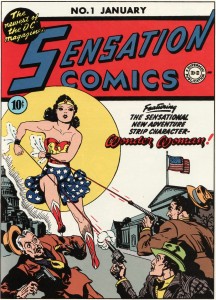 Batman and Superman are iconic characters and have changed and morphed over the decades since their first appearances. They have changed to stay relevant to comic book fans in a changing world.
Batman and Superman are iconic characters and have changed and morphed over the decades since their first appearances. They have changed to stay relevant to comic book fans in a changing world.
But how successful has that transformation been? The male heroes have become darker, grittier and grimmer, but what about Wonder Woman? How has she been able to stay relevant?
Has she been able to stay relevant?
Wonder Woman has had an interesting history that few comic book readers are familiar with.
In the early 1940’s the DC comics line was dominated by super powered male characters. Psychologist William Moulton Marston, the inventor of the polygraph, or lie-detector test, struck upon the idea for a new kind of superhero, one who would triumph not with fists or firepower, but with love. After introducing the idea to comic publisher Max Gaines, Marston, along with his wife Elizabeth, began to develop the hero who would eventually become Wonder Woman
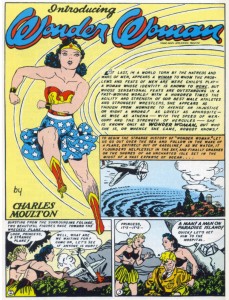 Marston was an unconventional figure in the 1940’s as was his wife, Elizabeth, whom he considered a model of the unconventional liberated woman. He was also inspired by a former student of his, Olive Byrne, who lived with the couple in a polygamous/poly-amorous relationship.
Marston was an unconventional figure in the 1940’s as was his wife, Elizabeth, whom he considered a model of the unconventional liberated woman. He was also inspired by a former student of his, Olive Byrne, who lived with the couple in a polygamous/poly-amorous relationship.
“Not even girls want to be girls so long as our feminine archetype lacks force, strength, and power.” Marston wrote in 1943. “Not wanting to be girls, they don’t want to be tender, submissive, peace-loving as good women are. Women’s strong qualities have become despised because of their weakness. The obvious remedy is to create a feminine character with all the strength of Superman plus all the allure of a good and beautiful woman.”
Marston used a pen name that combined his middle name with that of Gaines to create Charles Moulton. Marston intended his character, which he called “Suprema”, to be “tender, submissive, peace loving as good women are,” combining “all the strength of a Superman plus all the allure of a good and beautiful woman.” His character was a native of an all-female utopia who became a crime-fighting U.S. government agent, using her superhuman strength and agility, and her ability to force villains to tell the truth by binding them with her magic lasso. Her appearance, including her heavy silver bracelets (which she used to deflect bullets), was based somewhat on Olive Byrne.
In 2002, Heritage Auctions listed an original Illustration by Harry G. Peter, the first sketches of Wonder Woman, with notes from Marston on the look.
Editor Sheldon Mayer replaced the name “Suprema” with “Wonder Woman”, and the character made her debut in All-Star Comics #8 (December 1941).
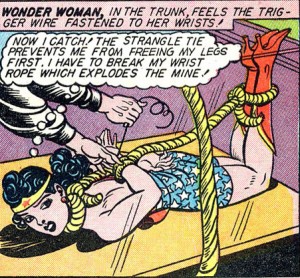 It was never smooth sailing with Marston who wrote the comics under the pseudonym Charles Moulton. Complaints began coming in almost immediately with one prominent bishop complaining that Wonder Woman was “not fully dressed”. Marston also had, it seemed, an obsession with bondage. He was extremely specific as to what kind of chains Wonder Woman should be bound with. A lot of Marston’s storylines involve Wonder Woman being tied up. “The secret of woman’s allure,” he once told Gaines, is that “Women enjoy submission—being bound.”
It was never smooth sailing with Marston who wrote the comics under the pseudonym Charles Moulton. Complaints began coming in almost immediately with one prominent bishop complaining that Wonder Woman was “not fully dressed”. Marston also had, it seemed, an obsession with bondage. He was extremely specific as to what kind of chains Wonder Woman should be bound with. A lot of Marston’s storylines involve Wonder Woman being tied up. “The secret of woman’s allure,” he once told Gaines, is that “Women enjoy submission—being bound.”
Wonder Woman was never allowed to be just a comic book like the other heroes. Gaines was in constant consultation with psychologists regarding Wonder Woman’s storylines. Great scrutiny was brought to her every action and to her wardrobe.
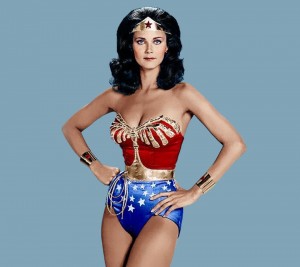 That was, sadly, not to change over the seventy year history of the character. Her origins have been revised many times throughout the decades, as has her outfit. With the television series from the 1970’s starring Lynda Carter, a good deal of campiness was introduced to the character. Carter was a voluptuous woman. In the Wonder Woman outfit, her assets were on prominent display, often overshadowing the character’s other virtues.
That was, sadly, not to change over the seventy year history of the character. Her origins have been revised many times throughout the decades, as has her outfit. With the television series from the 1970’s starring Lynda Carter, a good deal of campiness was introduced to the character. Carter was a voluptuous woman. In the Wonder Woman outfit, her assets were on prominent display, often overshadowing the character’s other virtues.
And that, I think, is part of the problem for Wonder Woman. She is a strong and potent ideal for feminism, but in a bathing suit. The cognitive dissonance of Wonder Woman almost rivals that of the Miss America Pageant where spin doctors try to portray it as a “scholarship program” but one where the contestants are required to participate in swimwear.
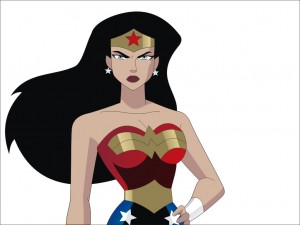 Women scholars are not to be judged based on how they look in a bathing suit. Neither should a superhero, but there’s the rub. Wonder Woman represents the pinnacle of heroic behavior but also of athleticism and beauty. In that respect she is representative of modern women in the pursuit of that balance. Still, not even her steel bracelets can protect her from society’s judgment and, often, scorn.
Women scholars are not to be judged based on how they look in a bathing suit. Neither should a superhero, but there’s the rub. Wonder Woman represents the pinnacle of heroic behavior but also of athleticism and beauty. In that respect she is representative of modern women in the pursuit of that balance. Still, not even her steel bracelets can protect her from society’s judgment and, often, scorn.
Changing her costume to something a little less sexist is fraught with controversy. Old school fans rail against the change and still others accuse the comic creators of pandering to feminists. Some readers want Wonder Woman to live up to feminist ideals. Others just want her looking hot in her costume.
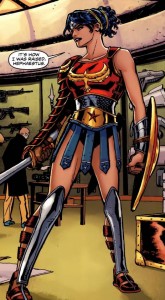 So what’s a Wonder Woman to do? Her latest incarnation (and, it seems, her upcoming appearance in the Superman vs. Batman film) has her more closely resembling Xena the Warrior Princess.
So what’s a Wonder Woman to do? Her latest incarnation (and, it seems, her upcoming appearance in the Superman vs. Batman film) has her more closely resembling Xena the Warrior Princess.
Greek Goddess… Miss America… Xena… which role does she play in order to make others happy. Isn’t that the dilemma of a woman today? She finds herself having to behave and dress in certain ways to make others (mostly men) happy. That’s the irony of Wonder Woman. For a character who is portrayed as being true to herself and to her heroic ideals, she has to, it seems, do an awful lot of pandering to her audience.
Along the way I have to wonder (pardon the pun) is she the representative of a feminine ideal or just a boob show? Is she a positive role model for women and girls or is she just a bit of cheesecake for male comic book readers?
I’d like to think it was the former, but after all this time I still don’t think the answer is entirely clear.
What do you think?

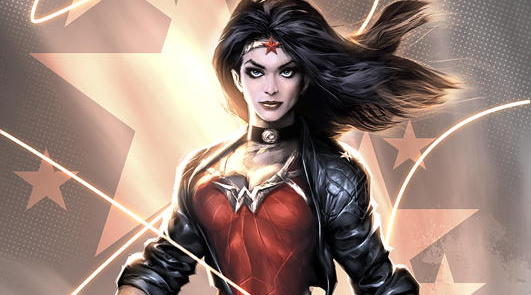
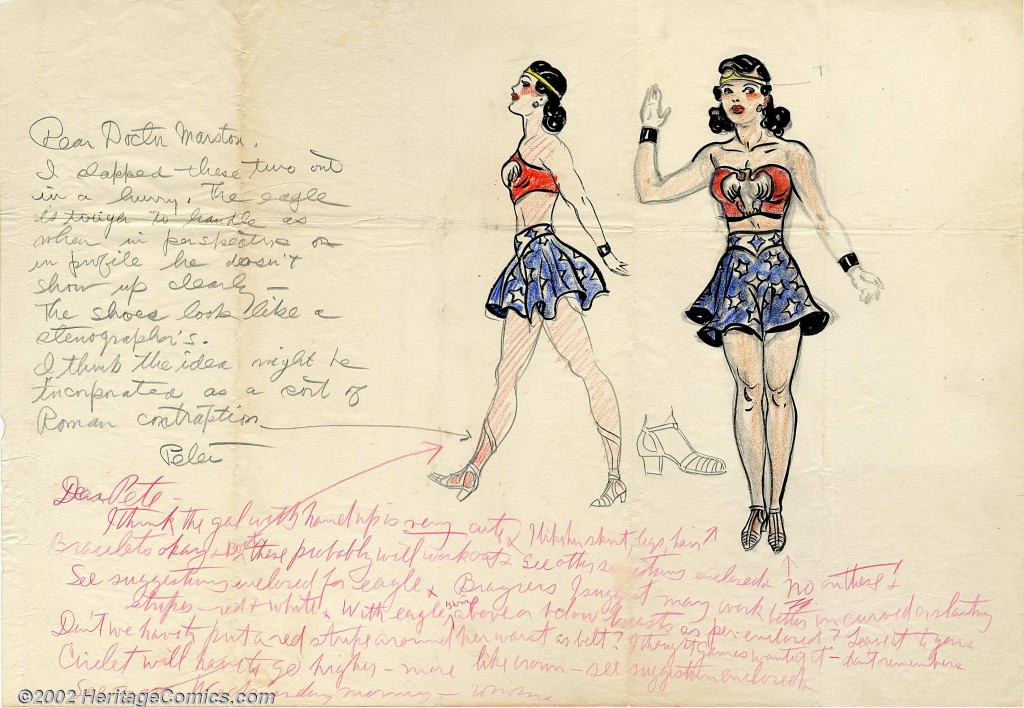




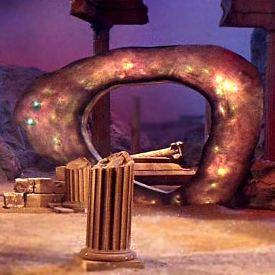


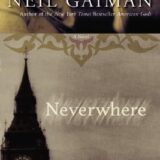


2 Comments